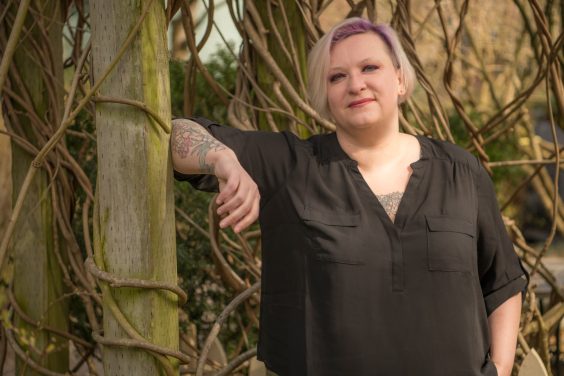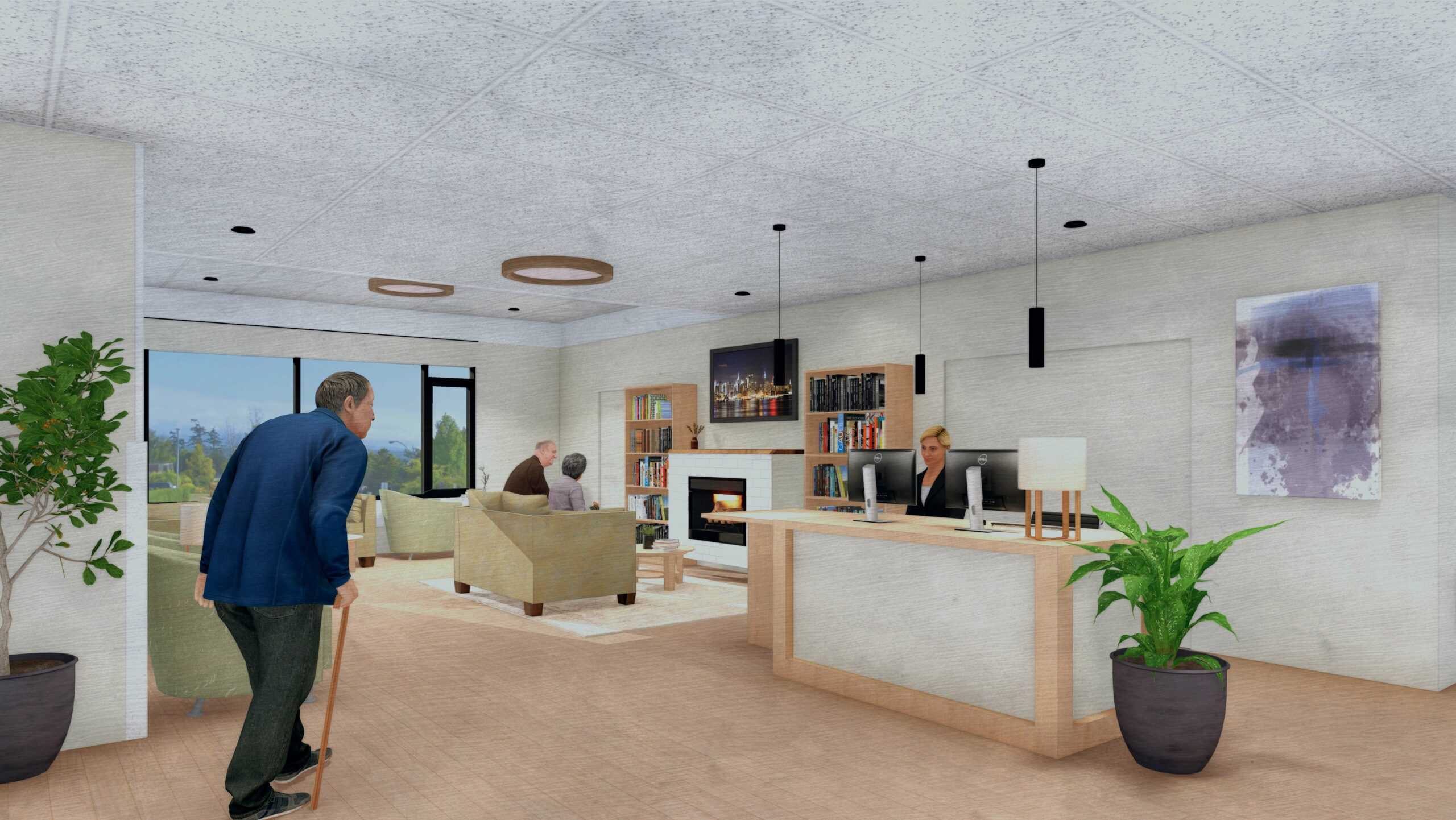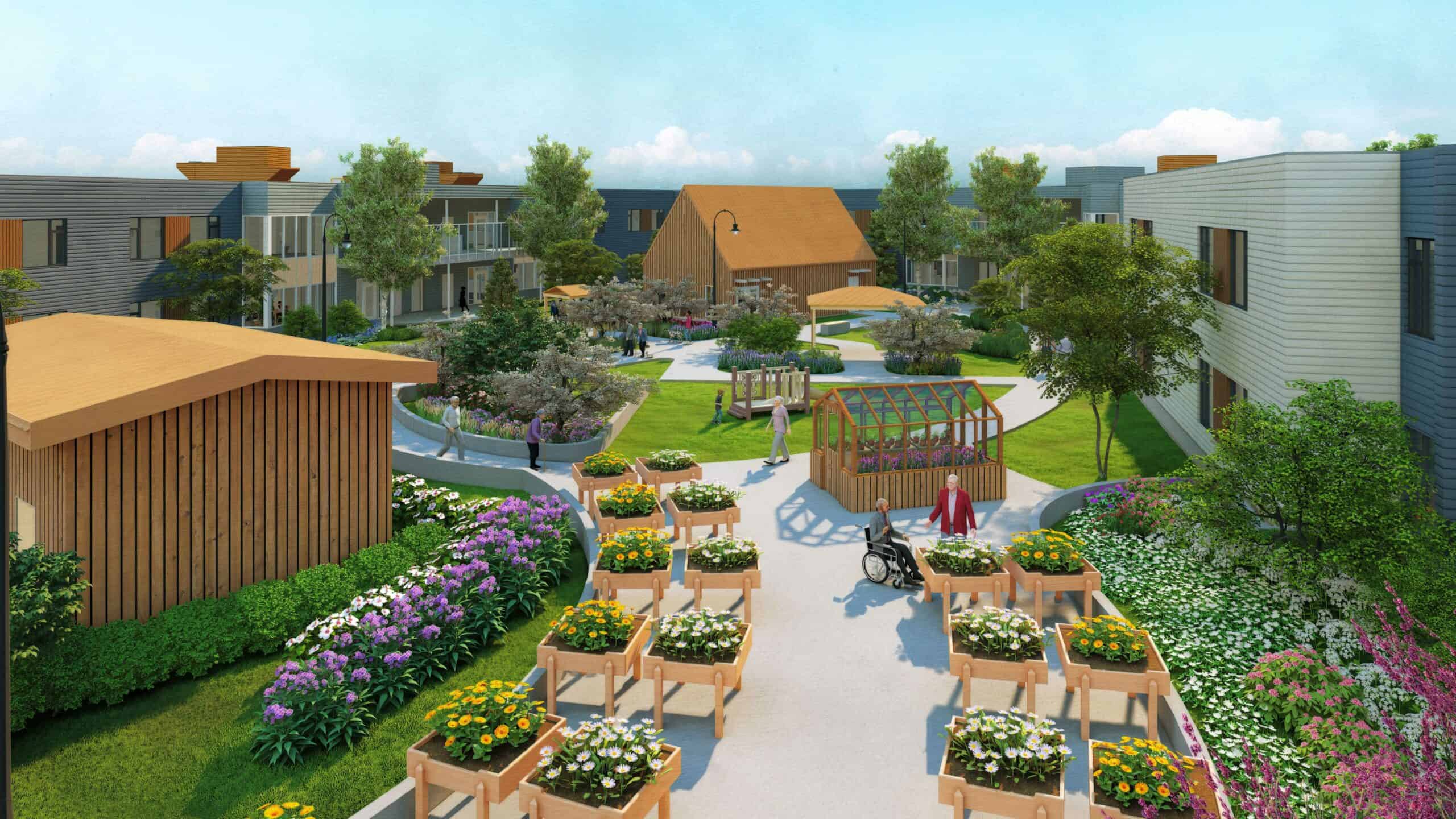This article originally appeared in The Daily Scan.
A research evaluation of Canada’s first public, non-profit long-term care village based on the concept of a dementia village will demonstrate the impact of an innovative new model of care on residents’ quality of life, staff care practice, and family experience outcomes.
It will also offer insights for real-time improvements while it is being implemented.
The number of seniors and people living with dementia is on the rise in Canada. The population of people aged 85 and older is one of the fastest-growing, and a 2022 report from the Alzheimer’s Society of Canada projects that by 2030 nearly one million Canadians will be living with dementia. Given these trends, there is a need for innovation in long-term care.
Providence Living at The Views, set to open in Comox, BC this summer, will be implementing a made-in-BC model of long-term care called Home for Us, which was jointly created by Providence Living and Providence Health Care and incorporates best practices from around the world. The village will accommodate seniors with and without dementia and younger adults requiring long-term care.
Funded by the St. Paul’s Foundation, the evaluation will look at the two main components of the village project: the new Home for Us model of care and its physical environment.
“This will be the first evaluation, certainly in Canada, of an implementation of this dementia-village type model in a publicly funded context,” says Dr. Amy Salmon, a scientist with the Centre for Advancing Health Outcomes (Advancing Health) and a clinical associate professor with UBC’s School of Population and Public Health, who is leading the evaluation.

Village model prioritizes autonomy, social connections
The key principles of the Home for Us model of care that Providence Living at The Views will be implementing are: emotional connections matter most; home is not a place, but a feeling; and residents direct each moment.
Unlike traditional long-term care settings, where care practices and routines are often dictated by institutional processes, Providence Living at The Views will offer residents the freedom to shape their own daily routines and activities, fostering a sense of independence and purpose, which studies show plays a vital role in active, healthy aging.
Fostering meaningful relationships is central to Home for Us. Residents will be supported to maintain strong family and community connections, and empowered to enjoy autonomous, meaningful lives. The model ensures that care providers have time to get to know who residents are as people while delivering excellent care.
The concept for Providence Living at The Views was inspired by the Hogeweyk care home in the Netherlands, the world’s first ‘dementia village’. Drawing on learnings from the Hogeweyk, Providence Living at The Views aims to provide an environment that feels like home, not like an institution. The 156-bed village will be structured into households of up to 12 residents, and will include amenities like a bistro, a childcare centre, an art studio, and community spaces.
“The village model provides a setting where residents can go out of their own households to neighbourhood destinations that we all go to, like a grocery store, a café, restaurant, or other places of interest,” says Dr. Habib Chaudhury, an Advancing Health scientist and professor of Gerontology at Simon Fraser University who is leading the portion of the evaluation focusing on the impact of the village’s physical environment. His team will evaluate resident and staff outcomes in relation to the physical design of the village and households. “That’s the fundamental idea of the physical setting of the village model, to create neighbourhoods with familiar destinations and accessible outdoor spaces, rather than just housing.”

While constructing the physical village infrastructure requires significant time and investment, Home for Us can be implemented throughout all existing and newly built Providence long-term care homes in collaboration with local health authorities.
Gathering data to maximize residents’ quality of life
The evaluation aims to assess the impact of both the Home for Us care model and the physical environment on patient’s quality of life and identify areas that could be improved going forward. Qualitative data on the project is collected through interviews with residents, staff, and family members, and ethnographic methods are used to map out residents’ daily lives. Researchers additionally use clinical and administrative data to compare outcomes with other long-term care homes. This collection, which began in 2021 and will conclude in 2026, will enable researchers to compare data from before and after the village opens.
Additionally, the evaluation team will use human resource data from Providence Health Care to track indicators of staff well-being.
“This new long-term care model, both the physical setting and the Home for Us care model, will hopefully impact staff’s job satisfaction as well, and they will become more effective in providing support and care to the residents every day,” says Dr. Chaudhury.
The evaluation is a large-scale project involving the collaboration of Advancing Health scientists from four universities. Dr. Salmon coordinates and supports the involvement of team members who bring specialized skills to the project, like Dr. Chaudhury.
“This has been a wonderful opportunity at Advancing Health for people to find new ways to work together, and how our expertise across our own different institutions, departments, and disciplines allows this kind of inquiry to thrive,” says Dr. Salmon.
The evaluation aims to ensure that the Home for Us and the village environment support the goal of Providence Living at The Views to deliver the highest quality standard of care. The knowledge gained from this evaluation will help to guide further implementation of this model of care.

“We’re hoping that the evidence that’s generated through this evaluation will help people to make decisions about scaling up. Not just whether it should happen, but also how, and where the most important investments in this change can be made with the goal of maximizing resident’s quality of life and wellbeing,” says Dr. Salmon.
Providence is working toward a future where communities around the world will be empowered to reform the existing institutionalized model of seniors’ care and adopt one that puts residents first. Providence Living at The Views will only be one example of the implementation of this innovative model. The new St. Vincent’s Heather long-term care home, in Vancouver, will implement the Home for Us social-relational model of care when it opens to residents. The project is currently in the rezoning process with the City of Vancouver. Construction is expected to start in 2025 and be complete in 2028.
Learn more about how we are transforming long-term care and the lives of seniors in BC and beyond.
